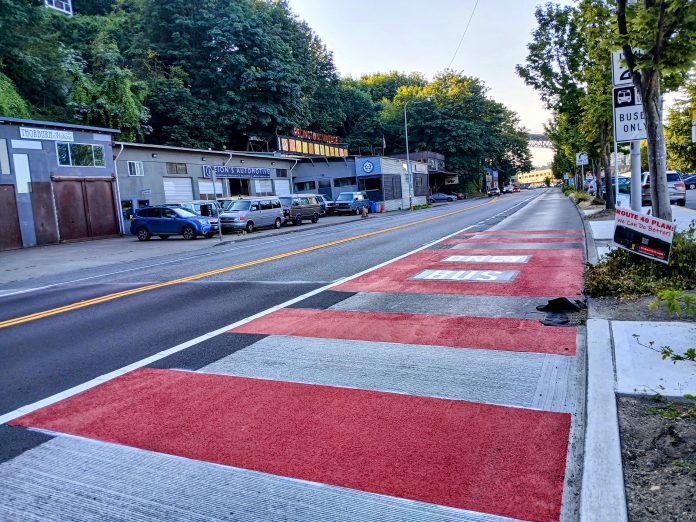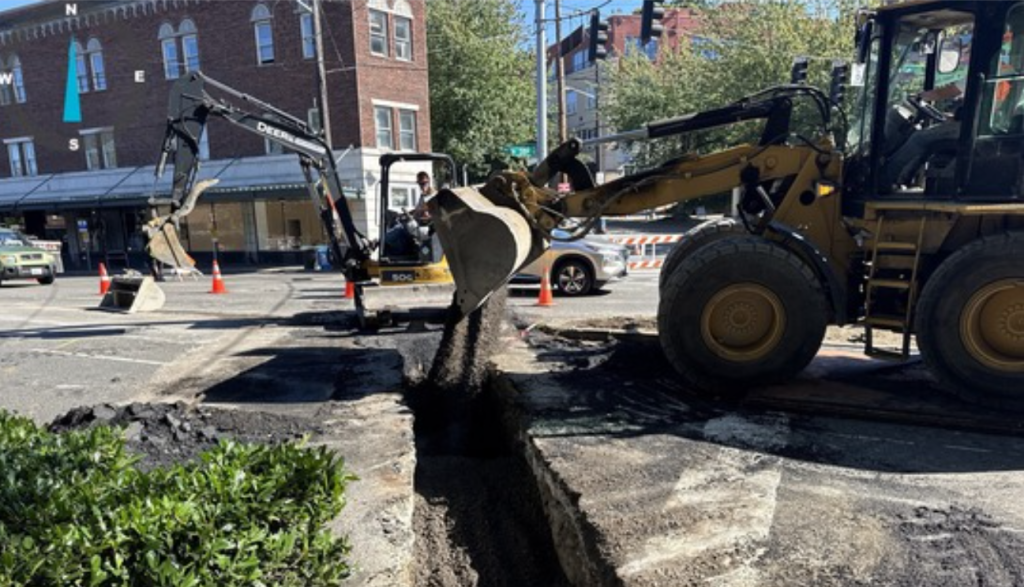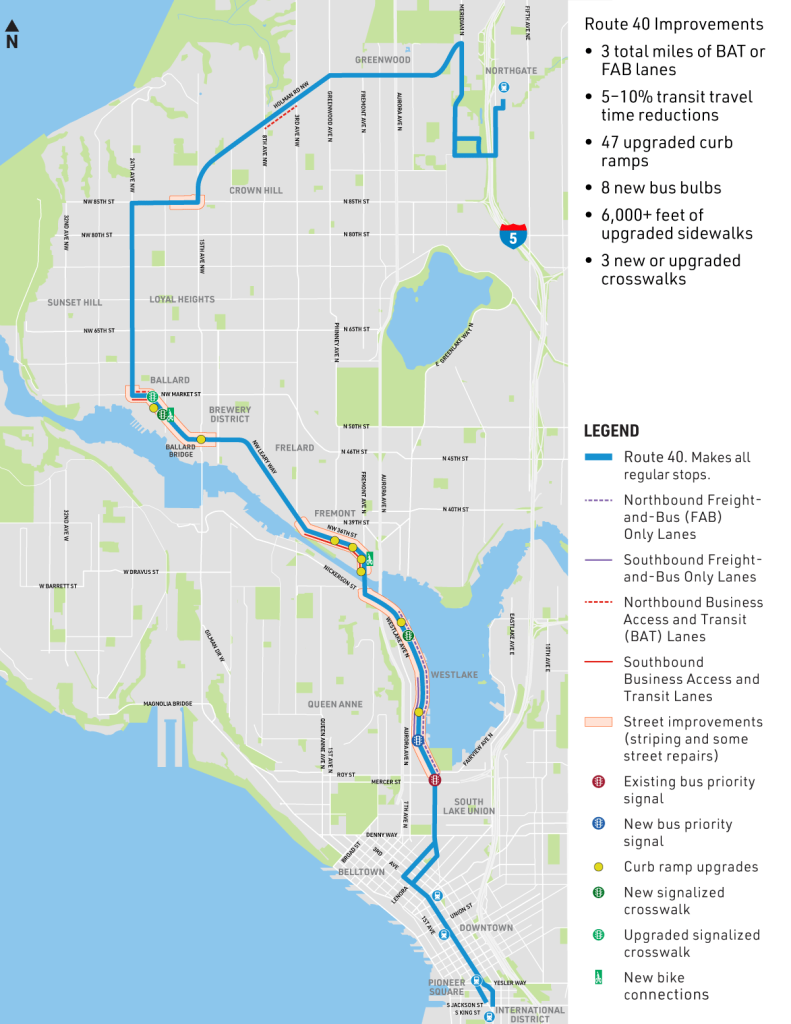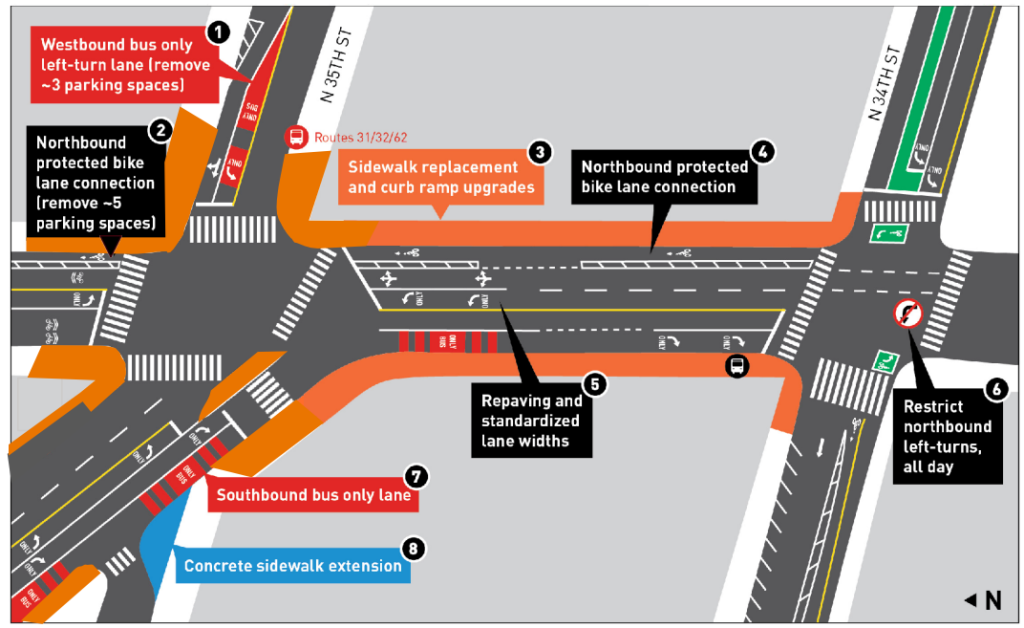
Construction on upgrades to the King County Metro Route 40 are well underway through the heart of Fremont, as any resident or recent visitor to the neighborhood can easily attest. With the $20.7 million bus improvement project also tackling the replacement of a 100-year-old water main along with sidewalk improvements and new curb ramps, work has been creating major disruptions for people using all modes of travel. Throughout this work, opponents have continued their push to scale back plans to create dedicated bus lanes for the Route 40 as part of the project.
A high-profile project from the 2015 Levy to Move Seattle, Route 40 upgrades originally had been promised to voters as a full upgrade to a RapidRide corridor. However, the project’s scope was scaled back due to funding constraints, but plans still proposed adding business access and transit (BAT) lanes, which prohibit general purpose traffic except drivers making right turns, along Westlake Avenue, N 35th Street and Leary Way.
Even without broader RapidRide upgrades, the project has been the subject of criticism from business owners and business advocacy groups since 2021 when initial designs were released. The Fremont Chamber of Commerce, the Ballard Alliance, and the North Seattle Industrial Association have made the argument that BAT lanes would negatively impact drivers.
While it was Eugene Wasserman, the North Seattle Industrial Association’s President, who initially led the charge to get the Route 40 improvements “restart[ed]” in 2021, the standard-bearer for the fight has become Pete Hanning, who lost a 2023 city council race to represent District 6 to Dan Strauss. Hanning has led the Fremont Chamber of Commerce since 2022.

“[T]he proposal to create a full-time bus-only lane in the Fremont core will cause significant impacts that we believe haven’t been fully addressed. Cutting the capacity for general traffic will inevitably increase congestion and hinder freight, emergency response and local vehicle movement,” Hanning wrote in a August 7 op-ed in the Seattle Times.
That op-ed followed a July 18 Seattle Times story by reporter Nicholas Deshais, which extensively quoted Hanning, but not any of the transit riders who are set be positively impacted by improvements in Route 40 travel times. The Times story also doesn’t mention that Hanning’s mother, Sooz Appel, is a property owner along Westlake Avenue N near the project and has also advocated against the BAT lanes.
Public records obtained by The Urbanist show Hanning has been also pressing city officials directly, most recently in a July 23 email to transportation committee chair Rob Saka. Citing concerns around construction impacts in Fremont, including potential work staging areas and sequencing, the email goes on to question the project’s core elements intended to improve transit travel times and bus reliability.

“In addition to the existing concerns regarding the project, we are particularly worried about the flawed assumption that a 24/7 bus-only lane in Fremont will provide enough benefits to Route 40 to outweigh the significant negative impacts it will have on freight and vehicular traffic on both sides of the Fremont Bridge,” Hanning wrote Saka. “Increased traffic congestion and limited access may deter customers and disrupt deliveries, causing significant harm to small businesses already struggling with construction and parking losses.”
Compared to Westlake Avenue, where BAT lanes have already been installed along most of the one-mile corridor in both directions, the Route 40 project takes a fairly light touch when it comes to transit priority through Fremont. No northbound BAT lanes are planned, and the installation of a one-block protected bike lane on Fremont Avenue N actually forced the relocation of bus stops to locations where riders have longer walks to transfer.
The southbound BAT lane through Fremont remains one of the only mechanisms speeding up buses through the area and ensuring that riders don’t wait behind a line of general-purpose traffic when the Fremont drawbridge is raised. Even with these modest bus upgrades, the project is expected to decrease travel times from Ballard to Downtown by 14% to 17%, a big benefit for the fourth-busiest route in King County Metro’s network that sees nearly 9,000 riders every weekday.

Hanning hasn’t been the only voice questioning Route 40 improvements through this construction period. An August 8th FOX 13 story by Nia Wong quoted Fremont property owner Michael Peck, of Peck Properties.
“It’s going to take away two dozen parking places and impact access to our businesses,” Peck told FOX 13. “They haven’t done a traffic study on this at all.”
In actuality, the Seattle Department of Transportation conducted several traffic studies, including one from 2021 and an additional one from 2023, looking at readjustments to bus stops in Fremont to make way for the planned protected bike lane. These studies are posted on the project website. The City is removing very few parking spaces to make bus upgrades, with virtually no parking removal happening in Fremont and several stalls in Ballard making way for larger bus stops.
FOX 13 did talk to one transit rider looking forward to the upgrades, Seamus Overcash. “The number of cars that I look at right now, even that are five-person occupancy vehicles and there’s one person in them — like, part of me doesn’t feel a whole lot of sympathy for it,” Overcash said. “Your 15-minute extra commute is kind of worth it for my 45-minute faster commute.”
Route 40 riders have been bearing the brunt of construction work on the corridor, with on-time performance last month slipping to its lowest level in at least five years. While part of an overall trend of increased traffic impacting King County Metro’s reliability metrics, the route clearly wasn’t helped by the major roadway disruptions that coincided with major I-5 preservation work that pushed freeway traffic onto parallel city routes. Despite the fact that the water main replacement in Fremont has been the most impactful part of the project, the transit improvements have taken much of the ire from frustrated Seattleites over the past few months.
While Seattle Council President Sara Nelson told the Fremont Community Council in 2023 that she opposes creating bus-only lanes on the Route 40, so far there are no signs that any city leaders intend to step in and halt the upgrades that are under construction. But as construction continues through the end of 2025, with some work extending into 2026, it doesn’t look like the Route 40’s new bus lanes will stop being a target anytime soon.
Ryan Packer has been writing for The Urbanist since 2015, and currently reports full-time as Contributing Editor. Their beats are transportation, land use, public space, traffic safety, and obscure community meetings. Packer has also reported for other regional outlets including BikePortland, Seattle Met, and PubliCola. They live in the Capitol Hill neighborhood of Seattle.

